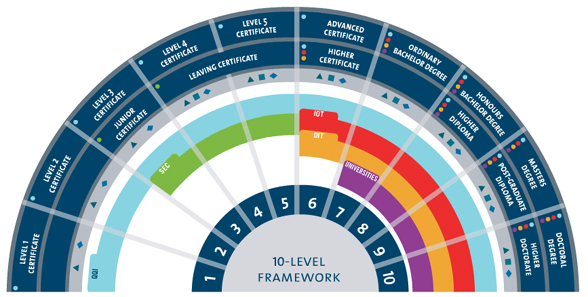Info
Get In Touch
HCT Ltd.
Unit 2, Purcellsinch Business Park
Dublin Road
Kilkenny
Tel.: 056 777 0761
National Framework of Qualifications (NFQ)

Levels
The National Framework of Qualifications (NFQ) is a system of ten levels. Each level is based on nationally agreed standards of knowledge, skill and competence i.e. what an individual is expected to know, understand and be able to do following successful completion of a process of learning. It recognises through the framework learning from the very initial stages to the most advanced stages and all such learning may be achieved in schools or colleges at work or in the home or community. They are called Accredited courses.Award-Class
As well as this 10 level structure, the NFQ includes different classes or categories of awards. These are different because they reflect a mix of standards of knowledge, skill and competence. This gives the learner the freedom to build their qualifications using accredited courses in ways that suit their needs.There are four classes of award-types:
- Major awards are the main class of award made at a level. You may have heard of some of these, for example the Leaving Certificate, the Advanced Certificate or the Honors Bachelor Degree. There are 16 major awards in the Framework, which can be seen in the ‘fan’ diagram.
- Minor awards provide recognition for learners who achieve a range of learning outcomes but not the specific combination of learning outcomes required for a major award. These awards allow learners to build up units of learning at their own pace to meet their own needs.
- Special-purpose awards are made for very specific purposes. An example of a special-purpose award is Driving - Heavy Goods Rigid.
- Supplemental awards are for learning which is additional to a previous award. They could, for example, relate to updating and refreshing knowledge or skills, or to continuing professional development.
QQI offers programmes at levels 1-6 and third level colleges and universities normally offer programmes at levels 7 to 10.
QQI and Common Award System
In November 2012 QQI was established under the Qualifications and Quality Assurance Education and Training Act, to replace the 4 existing awarding bodies and quality assurance responsibilities in Ireland (FETAC, HETAC, NQAI AND IUQB).A new national awards system called the Common Award System has been introduced and by 2014 all QQI Awards will be part of this system.
Under the Common Awards System (CAS) all QQI awards will have a common structure, and common characteristics and features such as title, level, volume, profile, assessment and grading. These common awards will be published on www.qqi.ie and available to all QQI registered Providers. Programmes leading to these common awards must be submitted from the Centre for validation and approved by QQI prior to delivery.
Former awards, originally developed by NCVA, FÁS, Fáilte Ireland, Teagasc and BIM, are currently being migrated to the new format - the Common Awards System. As soon as this exercise is completed for each level, the former awards will be deactivated and will no longer be available as a basis for certification.
In the Common Awards System, Providers may not offer programmes for certification unless the programmes have been validated by QQI. Validation is the process through which QQI determines that the programme developed by the Provider is fit for purpose; that it will give the profiled Learner the opportunity to meet the standards for the award(s), that it is appropriate to the Learner and that it fulfils the award requirements.
Each major award under the common award system will be awarded a total set amount of credits and these credits will need to be accumulated through achieving a number of minor awards.
| LEVEL | CREDIT VALUES FOR MAJOR AWARDS | DEFAULT MINOR CREDIT VALUES | OTHER PERMITTED CREDIT VALUES | SPECIAL PURPOSE AND SUPPLEMENTAL AWARDS |
|---|---|---|---|---|
| L1 | 20 | 5 | 10 | N/A |
| L2 | 30 | 5 | 10 | N/A |
| L3 | 60 | 10 | 5, 20 | 5 and 60 |
| L4 | 90 | 10 | 5, 15, 20 | 5 and 90 |
| L5 | 120 | 15 | 5, 15, 30 | 5 and 120 |
| L6 | 120 | 15 | 5, 15, 30 | 5 and 120 |
The following is an example of how the component certificates fit together:
QQI (NCVA) Level 5 Major award certificates will be awarded to a candidate who reaches the required standard in at least 8 modules made up as follows:
- 5 Vocational modules (including mandatory and elective modules)
- 2 General Studies modules (one of which must be communications)
- 1 Work Experience module
The General Studies module is intended to:
- Provide breadth and balance in the curriculum
- Enhance personal development
- Complement the area of vocational study
The General Studies module may be chosen from the list of QQI Courses (NCVA) Level 5 modules, (provided that it is not an elective vocational module for that certificate) or from the list of locally devised modules developed by the programme provider and approved by the QQI Council.
You need to be careful and know what award you are getting from a programme. i.e. is it a component certificate or is it a major award? You can generally judge by the number of contact hours. A minor award or component certificate can be completed in 30 or more contact hours. Whereas a major award will take you 240 or more contact hours to complete. However you can be sure if you enrol on a programme which has QQI accredited courses that the organisation delivering the programme has been through a rigorous quality assurance check and that the programme is monitored independently by QQI to ensure they achieve the highest standard. It is important to plan carefully what modules and what award you want to complete in order to maximise your investment and your time in getting your desired qualification.









